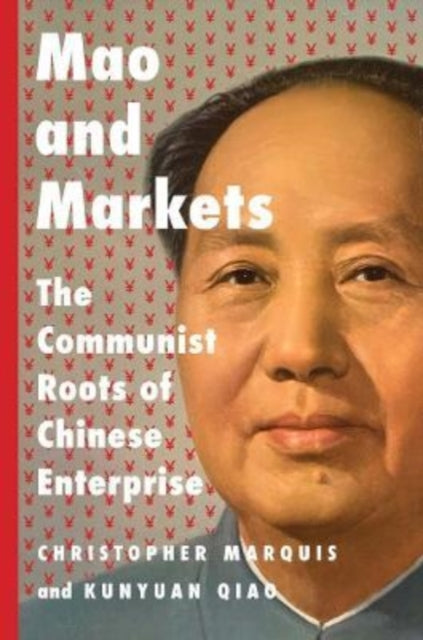Christopher Marquis,Kunyuan Qiao
Mao and Markets: The Communist Roots of Chinese Enterprise
Mao and Markets: The Communist Roots of Chinese Enterprise
YOU SAVE £1.20
- Condition: Brand new
- UK Delivery times: Usually arrives within 2 - 3 working days
- UK Shipping: Fee starts at £2.39. Subject to product weight & dimension
Bulk ordering. Want 15 or more copies? Get a personalised quote and bigger discounts. Learn more about bulk orders.
Couldn't load pickup availability
- More about Mao and Markets: The Communist Roots of Chinese Enterprise
In spite of China's embrace of open markets and private enterprise, the communist ideology of Chairman Mao continues to shape its economic success. This book argues that Mao's principles, mass campaigns, and socialist institutions have enduringly influenced Chinese entrepreneurs and their business strategies, demonstrating that private enterprise can coexist with a dedication to Maoist ideology.
Format: Hardback
Length: 384 pages
Publication date: 10 January 2023
Publisher: Yale University Press
A comprehensive examination of the enduring impact of Chairman Mao's communist ideology on China's economic success is presented in the Financial Times' "Best Book of 2022." Tied for the 2023 Axiom Gold Medal, sponsored by Axiom Business Book Awards, this book challenges the conventional belief that China's transition to open markets and private enterprise would lead to the demise of its state-controlled economy. Instead, China's remarkable growth over the past four decades has established state capitalism as a resilient counterbalance to the prevailing free-market orthodoxy, confounding many in the West.
In their book, Christopher Marquis and Kunyuan Qiao argue that China's economic success is intricately linked to the continued influence of Mao Zedong, the visionary leader who shaped the country's economic policies during the 1950s and 1960s. Through detailed case studies and quantitative analyses, the authors illustrate how Mao's ideological principles, mass campaigns, and socialist institutions have permeated every aspect of Chinese entrepreneurship and venture management. They demonstrate how Chinese companies have successfully reconciled commercial drive with a deep commitment to Maoist ideology, creating a unique business model that has propelled China's economic growth.
One of the key findings of the book is that private enterprise plays a pivotal role in China's economic development. The authors highlight the contributions of entrepreneurs and private companies in driving innovation, creating jobs, and expanding the country's global reach. However, they argue that the success of private enterprise is not merely a result of market forces but is also shaped by the enduring influence of Maoist ideology. Chinese companies, regardless of their size or sector, are deeply ingrained with the values and principles espoused by Mao, including the importance of collective ownership, social welfare, and the suppression of individualism.
The authors explore how Mao's ideological principles have influenced business strategies and decision-making processes in Chinese companies. They note that Maoist ideology promotes a strong sense of mission and dedication to the greater good, which has motivated Chinese entrepreneurs to prioritize long-term growth and social welfare over short-term profits. This commitment to social responsibility has led to the development of innovative practices, such as employee ownership, shared prosperity, and environmental sustainability, which are now integral to China's economic landscape.
Furthermore, the book sheds light on the role of mass campaigns and socialist institutions in shaping China's economic development. Mao's campaigns, such as the Great Leap Forward and the Cultural Revolution, aimed to transform the country's economy and society from feudal to modern and socialist. While these campaigns had significant setbacks and human costs, they also laid the foundation for China's industrialization and the establishment of a strong state-controlled economy. Today, the legacy of these campaigns continues to influence government policies, investment strategies, and the management of state-owned enterprises.
In conclusion, "The Enduring Influence of Mao: China's Economic Success and the Communist Ideology" offers a thought-provoking exploration of the complex relationship between China's economic success, Maoist ideology, and the enduring power of socialist institutions. By challenging the conventional narratives and providing a nuanced understanding of China's economic development, this book provides valuable insights for policymakers, business executives, and scholars interested in understanding the dynamics of China's rapidly evolving economy.
Weight: 648g
Dimension: 166 x 241 x 36 (mm)
ISBN-13: 9780300263381
This item can be found in:
UK and International shipping information
UK and International shipping information
UK Delivery and returns information:
- Delivery within 2 - 3 days when ordering in the UK.
- Shipping fee for UK customers from £2.39. Fully tracked shipping service available.
- Returns policy: Return within 30 days of receipt for full refund.
International deliveries:
Shulph Ink now ships to Australia, Belgium, Canada, France, Germany, Ireland, Italy, India, Luxembourg Saudi Arabia, Singapore, Spain, Netherlands, New Zealand, United Arab Emirates, United States of America.
- Delivery times: within 5 - 10 days for international orders.
- Shipping fee: charges vary for overseas orders. Only tracked services are available for most international orders. Some countries have untracked shipping options.
- Customs charges: If ordering to addresses outside the United Kingdom, you may or may not incur additional customs and duties fees during local delivery.


